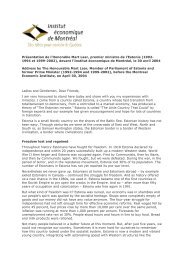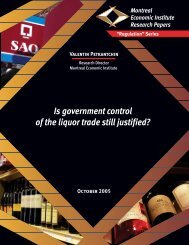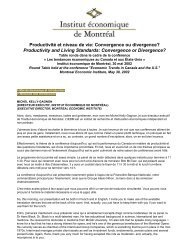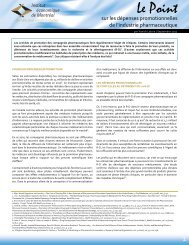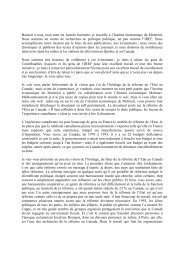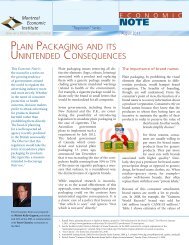The Consequences of a Fixed Book Price - IEDM
The Consequences of a Fixed Book Price - IEDM
The Consequences of a Fixed Book Price - IEDM
Create successful ePaper yourself
Turn your PDF publications into a flip-book with our unique Google optimized e-Paper software.
<strong>The</strong> <strong>Consequences</strong> <strong>of</strong> a <strong>Fixed</strong> <strong>Book</strong> <strong>Price</strong><br />
iedm.org<br />
access to books and greater literary diversity in the absence <strong>of</strong> a<br />
fixed book price.<br />
Conclusion<br />
<strong>The</strong> imposition <strong>of</strong> a fixed price would reduce the number <strong>of</strong> books<br />
sold. This would in all likelihood also entail a reduction in the number<br />
<strong>of</strong> titles available and potentially a reduction in the number <strong>of</strong> points<br />
<strong>of</strong> sale. Lower demand for books on the part <strong>of</strong> big-box stores would<br />
prevent publishers from enjoying the benefits they <strong>of</strong>fer. As a result,<br />
innovation in distribution would no longer have an influence on the<br />
supply <strong>of</strong> books.<br />
14. Idem.<br />
15. Office <strong>of</strong> Fair Trading, An Evaluation <strong>of</strong> the Impact upon productivity <strong>of</strong><br />
ending resale price maintenance on books, 2008, p. 92.<br />
16. Marcel Canoy, Jan C. van Ours and Frederick van der Ploeg, “<strong>The</strong> Economics<br />
<strong>of</strong> <strong>Book</strong>s,” in Handbook <strong>of</strong> the Economics <strong>of</strong> Arts and Culture, Volume 1,<br />
Victor Ginsburgh and David Throsby (eds.), 2006, p. 756.<br />
17. Francis Fishwick, Guerre des prix au Royaume-Uni: les lecteurs n’en pr<strong>of</strong>itent<br />
pas, Nos livres à juste prix, 2011.<br />
18. Office <strong>of</strong> Fair Trading, op. cit., note 15, pp. 50-51. Popular new releases are<br />
those that are among the 5,000 bestselling works.<br />
19. Michael Utton, “<strong>Book</strong>s Are Not Different After All: Observations on the<br />
Formal Ending <strong>of</strong> the Net <strong>Book</strong> Agreement in the UK,” International Journal<br />
<strong>of</strong> the Economics <strong>of</strong> Business, Vol. 7 (2000), No. 1, p. 122.<br />
20. <strong>The</strong> phenomenon <strong>of</strong> low print run editions is well illustrated by Christian<br />
Hjorth-Andersen, “A Model <strong>of</strong> the Danish <strong>Book</strong> Market,” Journal <strong>of</strong> Cultural<br />
Economics, Vol. 24 (2000), No. 1, pp. 36-39.<br />
Where they exist, fixed book price laws entail a<br />
reduction in the supply <strong>of</strong> new literary titles.<br />
<strong>The</strong> vitality <strong>of</strong> the book industry is an essential condition to the<br />
dynamism <strong>of</strong> Quebec culture. By imposing an increase in the price <strong>of</strong><br />
books, we would be swimming against the tide <strong>of</strong> history. It is those<br />
individuals who are least disposed to purchase books who would most<br />
change their consumption habits. Moreover, this measure would not<br />
protect independent bookstores from technological changes in the<br />
industry, and would therefore fail to achieve its stated goal.<br />
4<br />
References<br />
1. Table de concertation du livre, L’industrie se mobilise pour réclamer une réglementation sur<br />
le prix des nouveautés, press release, CNW, August 22, 2012.<br />
2. British Library, “Printing during the nineteenth century,” Aspects <strong>of</strong> the Victorian book.<br />
3. Simon Eliot, “From Few and Expensive to Many and Cheap: <strong>The</strong> British <strong>Book</strong> Market,<br />
1800-1890,” in A Companion to the History <strong>of</strong> the <strong>Book</strong>, Simon Eliot and Jonathan Rose<br />
(eds.), Blackwell Publishing Ltd, 2008, p. 298.<br />
4. H. R. Tosdal, “<strong>Price</strong> Maintenance in the <strong>Book</strong> Trade,” Quarterly Journal <strong>of</strong> Economics,<br />
Vol. 30 (1915), No. 1, pp. 86-109; Michael Utton, “<strong>Book</strong>s Are Not Different After All:<br />
Observations on the Formal Ending <strong>of</strong> the Net <strong>Book</strong> Agreement in the UK,” International<br />
Journal <strong>of</strong> the Economics <strong>of</strong> Business, Vol. 7 (2000), No. 1, pp. 115-126.<br />
5. L. A. Skeoch, “<strong>The</strong> Abolition <strong>of</strong> Resale <strong>Price</strong> Maintenance: Some Notes on Canadian<br />
Experience,” Economica, Vol. 31 (1964), No. 123, pp. 260-269.<br />
6. François Écalle, “Une Évaluation de la loi du 10 Août 1981 relative au prix du livre,”<br />
Économie & prévision, Vol. 86 (1988), p. 45.<br />
7. Benoît Allaire and Claude Fortier, L’évolution des dépenses culturelles des ménages québécois,<br />
de 1997 à 2009, Observatoire de la Culture et des Communications du Québec, No. 19,<br />
May 2012, p. 4.<br />
8. Ibid., p. 5. <strong>The</strong> data are for the year 2009, the most recent available, and exclude textbooks.<br />
9. Ministère de la Culture, des Communications et de la Condition féminine, Les pratiques<br />
culturelles au Québec en 2009 parmi les groupes sociaux, April 2011, pp. 89 and 96. <strong>The</strong>se<br />
data are from 2009.<br />
10. Canadian Heritage, Reading and Buying <strong>Book</strong>s for Pleasure, 2005 National Survey, Final<br />
Report, March 2005, pp. 51-52.<br />
11. See the technical annex to this Economic Note, available at iedm.org, for the detailed<br />
sources <strong>of</strong> these price elasticities.<br />
12. This calculation <strong>of</strong> the reduction in book sales is ceteris paribus, which is to say “all other<br />
things being equal.” Things other than price have an influence on book sales, like increases<br />
in household income, the presence <strong>of</strong> substitute goods like DVDs and electronic books,<br />
the propensity to read, etc. <strong>The</strong> 14.2% reduction in book sales does not happen from<br />
one year to the next, but evolves gradually in relation to the sales trend that would have<br />
obtained without a fixed price law.<br />
13. Mathieu Perona, Essai de mesure de l’élasticité-prix de la demande de livre et de disques<br />
en France, 1960-2003, Mémoire de DEA, École d’économie de Paris, 2003-2004, pp. 37<br />
and 45.<br />
910 Peel Street, Suite 600<br />
Montreal (Quebec) H3C 2H8, Canada<br />
Telephone: 514-273-0969<br />
Fax: 514-273-2581<br />
Website: www.iedm.org<br />
<strong>The</strong> Montreal Economic Institute is an independent, non-partisan, not-forpr<strong>of</strong>it<br />
research and educational organization. Through its publications, media<br />
appearances and conferences, the MEI stimulates debate on public policies in<br />
Quebec and across Canada by proposing wealth-creating reforms based on<br />
market mechanisms. It does not accept any government funding.<br />
<strong>The</strong> opinions expressed in this study do not necessarily represent those <strong>of</strong> the<br />
Montreal Economic Institute or <strong>of</strong> the members <strong>of</strong> its board <strong>of</strong> directors.<br />
<strong>The</strong> publication <strong>of</strong> this study in no way implies that the Montreal Economic<br />
Institute or the members <strong>of</strong> its board <strong>of</strong> directors are in favour <strong>of</strong> or oppose<br />
the passage <strong>of</strong> any bill.<br />
Reproduction is authorized for non-commercial educational purposes<br />
provided the source is mentioned.<br />
Montreal Economic Institute © 2013<br />
Illustration: Ygreck Graphic design: Mireille Dufour



